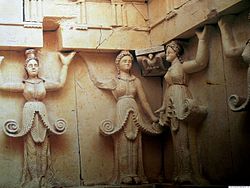Isperih
Isperih (Bulgarian: Исперих) is a small town in Northeastern Bulgaria, notable mostly for the nearby ancient Thracian Tomb of Sveshtary, a UNESCO World Heritage site. There's also the ruins of a Thracian city and the grave of a Muslim mystic.
Understand
[edit]

Isperih is about 30 km (19 mi) from the province centre Razgrad, 70 km (43 mi) from the nearest large city (Ruse on the Danube), and 105 km (65 mi) from the nearest international airport (Varna on the Black Sea coast). Both Ruse and Silistra are also major border crossings with Romania.
The name is pronounced is-peh-RIH, the last H is not silent. The then-village got that name in the 1930s, when rising nationalist sentiment caused a wave of name changes for settlements with "un-Bulgarian" names. "Isperih" is the Slavic form of Asparuh, the medieval ruler considered the founder of Bulgaria (he established the First Bulgarian Empire in 681). As the village continued growing, it gained town status in 1960.
With a population of about 8,000 people (2021), Isperih is the second-largest settlement in Razgrad Province after Razgrad itself. Notably, the local population is mixed - while in Isperih itself it's about 52% ethnic Bulgarians and 31% Bulgarian Turks, the broader Isperih Municipality is one of the few places in Bulgaria where the majority is Bulgarian Turks - about 58%, to 25% ethnic Bulgarians (per the 2021 census).
Get in
[edit]- 1 Railway Station (southern edge of town). Small, utilitarian building. Isperih is on a secondary line that connects Silistra with the Ruse-Varna line at the village of Samuil. This means that getting to Isperih requires changing trains at Samuil, with the exception of the direct trains Ruse-Silistra (once daily in each direction, 2 hr from Silistra, 2½ hr from Ruse, 65 min from Razgrad). The other options take longer due to both the changes and slower trains (two trains daily in each direction). Timetables and a virtual arrival/departures board can be found on the website of BDZ (Bulgarian State Railways).
- 2 Bus Station. Decaying two-story building. Used by smaller local companies and the larger Union Ivkoni/Group Plus and ArdaTur. The bus station's website claims lines from/to Razgrad, Ruse, Shumen, Silistra, and even Varna, but the timetables are only in Bulgarian, so you'll have to use machine translation.
Get around
[edit]See
[edit]In Isperih itself:
- 1 Monument to Asparuh (on the short pedestrian main street next to the Municipality building). Equestrian statue of Asparuh on a plinth, with secondary statues of medieval warriors. Another product of the Communist regime and the 1981 celebrations of the 1300th anniversary of the founding of Bulgaria (as the First Bulgarian Empire).
- History Museum
Most notable sights are outside of town, in an area between the villages of Sveshtari and Malak Porovets, the so-called Sboryanovo Archeological Reserve:
- 2 Thracian tomb of Sveshtari (3 km (1.9 mi) southwest of Sveshtari; Road 205 to the village splits off Road 23 west of Isperih, then in the village a road leads west and south-west to the Tomb). Mar-Nov: W-Su 9:00-12:30, 13:00-16:30 (closed M-Tu); Dec-Feb: closed. A Thracian tomb in a burial mound from the 3rd century BC, a UNESCO World Heritage site, the largest of multiple mounds on the site. A unique element for ancient Thracian art is the stone reliefs of caryatids (female figures "supporting" the roof) along the walls of the burial chamber. Guided tours in groups only, you may have to wait until a sufficiently large group gathers. Information about tours in English is unclear.
- Ruins of Helis - the capital of the Getae, an ancient Thracian tribe/nation, 4th-3rd centuries BCE. Unimproved ruin, with little surviving above foundation level, but at least there are information signs.
- 3 Tomb of Demir Baba (Demir Baba Teke). The mausoleum of a 16th century saint of the Alevi, a syncretic/mystical tradition within Islam. Still considered holy and attracting pilgrims in addition to the tourists.
Do
[edit]Buy
[edit]Eat
[edit]Drink
[edit]Sleep
[edit]The only hotel of the town is named Alen Mak, which also has a restaurant.


 Français
Français Italiano
Italiano




